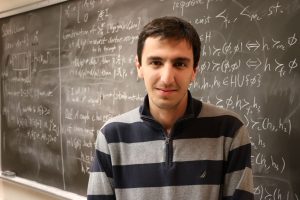Can you tell me about your experience with IDS2?
IDS2 is a new and growing institute with a rich set of faculties. There are lots of exciting activities, including seminars that happen weekly. The faculties of the institute are very nice and collaborative. We have had several friendly chats in which we explored the possibility of collaboration and discussed my path forward to academia.
What are you working on? 
Right now, I am working on a few problems that are related to my Ph.D. work: submitting them to journals and doing some minor edits. I am also working on some new problems with my Postdoc advisors. I have started to work on online relearning and Reinforcement learning. I am somewhat new to this area, as my Ph.D. work is related to random graphs; however, this is an opportunity to expand my knowledge and explore a new field. I am also trying to study these problems in a more familiar setting, i.e., on graphs and possibly random graphs.
During my Ph.D., my work was concentrated on the theoretical aspect of random graphs and graphs in general. For my postdoc at IDS2, I am leaning toward application. I should emphasize that I am not working with data, at least for now; rather, by leaning toward application, I mean to study problems that are motivated by real-world phenomena.
What are you most looking forward to?
I am planning to apply for an assistant professorship tenure track. Being a prospective faculty member, I should be able to teach and lead in research.
Teaching is one of my passions. Sharing my knowledge is one of the most enjoyable activities for me, and I’ve been lucky to be involved in this process soon after entering college.
Leading in research needs two primary skills: problem-solving and asking the right question. During my Ph.D., my focus was to become a problem solver and learn the techniques that help me do so.
An essential skill for leading in research is to ask the right question and to find a good problem. It is crucial to find problems that are solvable, neither too easy nor too hard, and have audiences. A faculty member should have problems that suit people with different knowledge ranges: bachelors, masters, and Ph.D. students. Mastering this skill will take years of training and trial and error. I hope to advance this skill during my stay in IDS2 as a postdoc.
What is your schooling background?
I received my B.Sc. from the Sharif University of Technology, Iran, in Mathematics, as well as Electrical Engineering. I hold an M.Sc. in Electrical Engineering and an M.Sc. in Mathematics from the University of Michigan. I got my Ph.D. from the University of Michigan in electrical engineering.